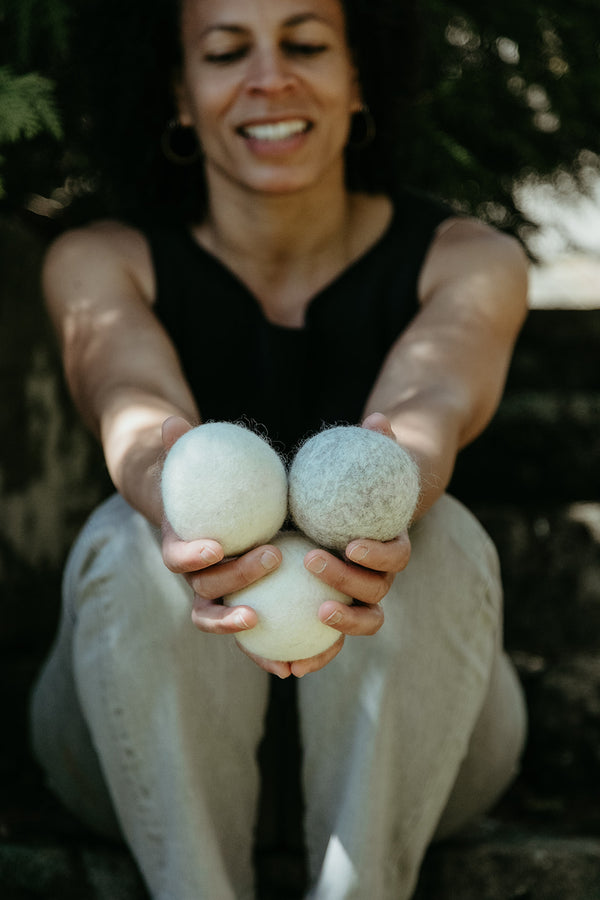Your Cart is Empty
Pick Your Perfect Pack
Pick Your Perfect Pack
Three Generations of Laundry Practices
March 07, 2017 3 min read

At the turn of the last century, neighbors in rural Mississippi kept a tidy home inside and out. Grandma Baker and her family were no exception.

As my mom’s mother has recounted, they washed their laundry on the back porch. Each piece was individually cleaned using a washboard then rinsed in a tub of clean water. This was rough work, especially when they accidentally rubbed their knuckles on the board.
Whites were boiled in an iron pot in the backyard and laundry was hung on a clothesline to dry.
While they washed on Monday and ironed on Tuesday most weeks, winters could be challenging. Clothes would freeze stiff on the clothesline so laundry was brought indoors and stood in a corner until thawed. If weather conditions were especially severe, they’d string the clothesline across the kitchen and hang laundry there.
Dresses and shirts were starched with a mixture of flour and water poured into boiling water. Next was ironing—sheets, underwear, dresser scarves and socks included. Most items were cotton, so that meant a lot of ironing.
At the time they had “sad irons” they heated on the stove. These worked well during cold winters but in summer they made the house too hot. Grandma Baker would sometimes use a bucket of charcoal outside to heat the iron and often did the ironing out there, too.
There was an unspoken competition among the neighborhood women to see who could finish their laundry and hang it on their clothesline before noon.
Knowing Grandma Baker, she was a regular winner.
• • •
My mom moved from Arkansas to Michigan when she was about a year old. Her mom had started doing things a bit differently by then.
They owned a wringer washer, an early tub-style washing machine. Clothes were still cleaned by hand with a washboard; the wringer squeezed out any excess water. It wasn’t until years later that they had an automatic washer and even later before a dryer arrived.
Grandma Baker taught her and my aunt to do laundry, which included properly sorting and cleaning clothes. Dirty clothes were never acceptable, even socks.
Even if it took a second rub on the washboard, that’s just what they did. There was no way neighbors would witness grayish clothes on the clothesline; only white was acceptable.
The day after wash day was ironing day. They had graduated from Grandma Baker’s early days to an electric iron and spray starch in a can. The iron didn’t have a steam option so they used a spray bottle. And just like when my grandmother was growing up, my mom ironed every item. Jeans, shirts, dresses, sheets—every piece.
• • •
In true Baker fashion, my two sisters and I learned to do laundry early on. In fact, I was in the first grade.
With my mom working on our farm the chore became ours. One day she called us together and showed us how to sort, measure detergent and properly fill the washing machine. No partial loads allowed.
My mom was meticulous with the laundry. She showed us how to fold, hang up laundry and put things away, leaving a pile for ironing. By this time, about the late 1970s, permanent press was the rage so little ironing was needed as long as we removed items from the dryer right away.
My sister would tease our mom because she herself would iron the most ridiculous things—pillowcases, sheets, T-shirts, pajamas.
For me laundry has always been using a washer and dryer. In college, after many trips to the Laundromat, I couldn’t wait to have my own set at home. Between my husband’s work clothes, workout clothes and having a 7-year-old boy, I do at least one load a day. I prefer spreading out the chore during the week rather than waiting until the weekend to do several loads.
This household practice has definitely changed since Grandma Baker’s early days. It is easier with today’s advanced machines and laundry products (LooHoo Wool Dryer Balls included!). But one thing remains: The art of doing laundry leads to a sense of accomplishment that has transcended generations.
I think Grandma Baker would be proud.
Subscribe
Sign up to get the latest on sales, new releases and more …

Join the LooHoo Community
Sign Up Now to be the first to learn about new products, sales and giveaways.

